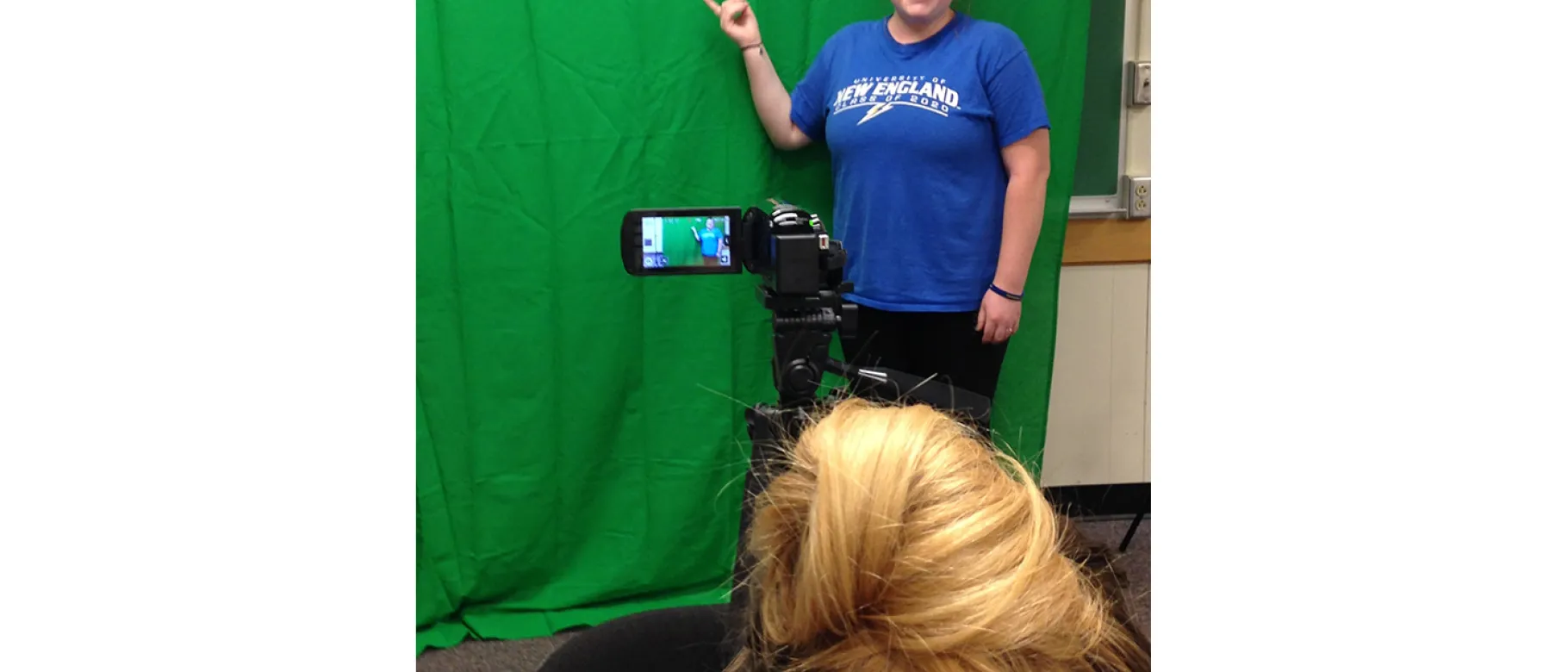Undergrad digital literacy advisers provide help to fellow students

At UNE, students are increasingly expected to develop their digital literacy as they complete coursework. While most students easily navigate social media platforms or the web, not all are comfortable using digital tools to create projects for class. Enter the digital literacy adviser. Digital literacy advisers are fellow undergraduate students who have chosen to advance their digital skills through coursework and hands-on practice and who offer additional support, beyond classroom instruction, to students as they begin building their professional digital identities.
The role of digital literacy adviser was created in 2016 to support UNE’s ePortfolio project – the creation of individual websites by students to collect, organize and preserve their writing and digital projects and to demonstrate their content knowledge and digital skills throughout their years at UNE. Now, working in UNE’s new DigiSpace, located in Decary 051, the digital literacy advisers assist students with all things digital, from podcasts to iMovies, and the DigiSpace provides access to equipment such as MacBooks, a digital camcorder and green screen, as well as videography and editing software.
In the past, digital literacy advisers provided support and encouragement to their peers on a drop-in basis only, but this semester they have added classroom visits to their repertoire as well, visiting English and Spanish classes. Jennifer Gennaco, adjunct associate lecturer, professional writing specialist and DigiSpace coordinator, explained that during these classroom visits, the digital literacy advisers not only assist students, but they help faculty, as well. “Although they primarily assist students, they are also available to discuss digital tools or problem-solve as issues arise,” she noted. “I hope to develop this practice to create strong relationships between the advisers and faculty because faculty, students and digital literacy advisers all benefit from these classroom visits. Faculty and students feel supported in their development of digital projects, and advisers feel valued in their contributions to the UNE community.”
Adviser Lindzee Ridley, a second-year Athletic Training major, has observed the significant benefits afforded to students who seek digital literacy services. “Every student ends up leaving with a newfound confidence” in his or her digital skills, she remarked. The students who have used the services agree. Sarah Desmarais (’21) commented on the skills she acquired by working with a digital literacy adviser. “From uploading, recording and designing a podcast to customizing my space to how I like, DigiSpace placed me in the right direction to succeed and express myself in my English class,” she said. “I left with confidence after exploring new and creative ways to use my ePortfolio. I learned much more… by going to DigiSpace rather than trying to figure it out on my own.”
The benefits are not one sided, however, but are mutually shared in the adviser-peer relationship. Ridley noted that as the result of her work as a digital literacy adviser, her public speaking skills have improved, and she and the other advisers feel valued by the learning community. “It is always satisfying to know we have done our job, and we love when students and teachers express their gratitude towards our work,” she stated.
According to Gennaco, digital literacy advisers have helped approximately 70 students in the DigiSpace since mid-September. With about 800 undergraduates maintaining ePorfolios, she anticipates that the advisers’ services will continue to be sought with increasing frequency.
The DigiSpace and UNEPortfolio project are funded by the Office of Strategic Initiatives, the College of Arts and Sciences, and the Department of English. Many faculty who include digital projects in courses developed their practices through a faculty seminar or workshop generously funded by The Davis Educational Foundation.
To learn more about the DigiSpace, ePortfolios and the services offered by digital literacy advisors or to inquire about becoming a digital literacy adviser, visit http://uneportfolio.org/ or visit the DigiSpace in Decary 051.
To apply, visit www.une.edu/admissions